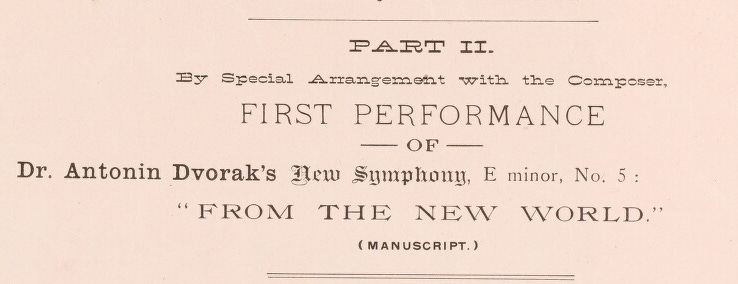Good News
I have a book!
Hi! It’s been about two months since you last heard from me.
Like most professors, I’ve been focused on preparation for an uncertain fall semester and doing my best to muddle through the global mess we’re in.
Some of you might remember my post from mid-May discussing my plan for getting out of work debt. I’m closing in on zero but still struggle with email!
Putting energy into this debt has included writing a book on Dvořák’s New World Symphony for the Oxford Keynotes series. It might sound like great excess productivity, but the book was due to the publisher in 2017. It’s a major debt that had been weighing me down for three years!

If I’m being honest with myself, I’d written about 600 words by the original deadline and did everything I could to avoid writing it, including working on a separate book project altogether. Friends, I don’t recommend this!
But here’s the good news: My book is now done, fully edited, and in the publisher’s hands. We’re looking at a tentative release date in early 2021, and I think you’ll like it!

A Quick Overview
From the prologue:
The typical concert hall experience is designed to remove music from the messiness of politics, as if it occupies a space outside time and lived history. But how can a piece of music so deeply entangled in racial politics ever be grasped with a frame that doesn’t account for the exploitation of Black labor? The erasure of Black history? The relative absence of Black music and musicians in those very concert halls? This book argues that the New World Symphony crystallized the racialization of American classical music that has marked its history for nearly two centuries.
The book has eight short chapters. The first five each trace a specific theme in American classical music discourse as they funnel toward the symphony’s premiere in 1893. Then things blow up. Then things get really wild.

One of my goals was to include a factoid on virtually every page that I’d never seen published before. To that end, the cast of characters is wide and completely reorients who we might think of as “important” or “popular” figures. Frederic Hymen Cowen? John Broekhoven? Frank Saddler? Even Kim Jong-il. Further, I’ve introduced several significant Black voices into the narrative, from musicians like Will Marion Cook and Sissieretta Jones (and of course Harry T. Burleigh) to W.E.B. DuBois and an aspiring artist from Sumter, South Carolina named Gamewell Valentine.
All of this is crammed into about 35,000 words (or roughly 120 pages), so this is a book you could read in one afternoon. But I hope it’s one you could consult again and again for accurate information and a sharp interpretation of a pivotal moment whose aftershocks we’re still feeling today. And no deep background is necessary. The prose is meant for general readers, not just scholars.
I’ll certainly have more to say about the book as it moves through the production process. And thanks to all of you for giving me the confidence to push through to the end. The feedback I’ve received on this blog over the last several months is what got me through the worst case of writer’s block I could imagine.

Music City Spotlight: You need to check out this outstanding episode of Colleen Phelps’s podcast “Classically Speaking” for a discussion of Joel Thompson’s The Seven Last Words of the Unarmed. It features folks I’ve highlighted in this space—Patrick Dailey and Kelly Corcoran—as well as several other brilliant speakers.
Unrelated to Nashville, but also highly recommended: Katy Henriksen’s upcoming Trillium Salon Series featuring music by Florence Price! Saturday, August 1. See the website for more details.
In the queue: “Classical Music and Politics” and more on the book
Content fueled by Badbeard’s Microroastery (Portland, OR).
If you like what you read here:

